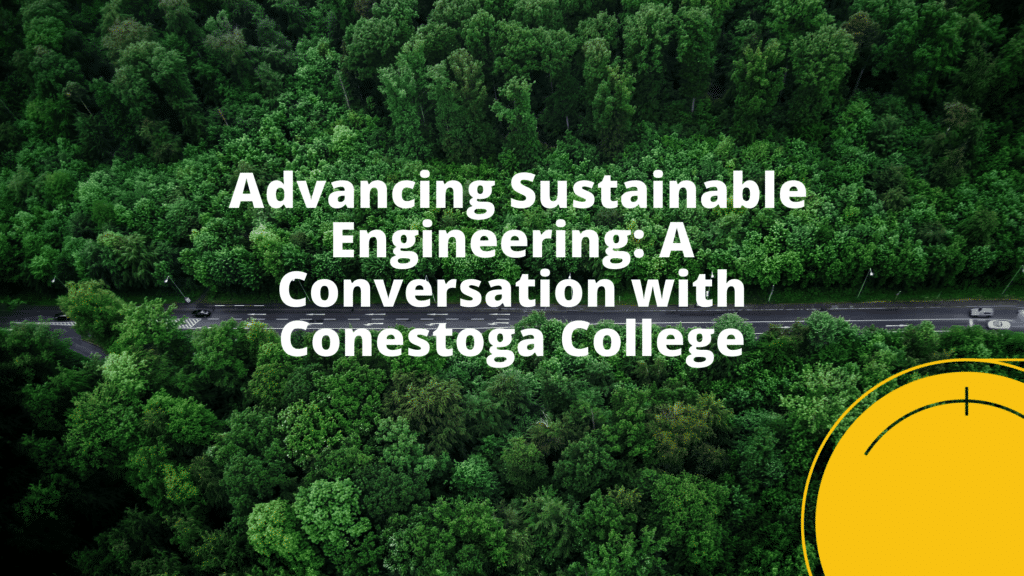
This month, National Engineering Month (NEM) Ontario is featuring leaders within Ontario’s engineering community who are making an impact. As part of this initiative, we spoke with Mohammed Heidari, a professor in the Sustainable Design Engineering (SDE) program at Conestoga College Institute of Technology and Advanced Learning, to discuss how the institution integrates sustainability, innovation and hands-on learning into engineering education.
Q: Can you tell us a bit about yourself and your work at Conestoga?
I’m a professor in the Sustainable Design Engineering (SDE) program at Conestoga, though I also teach in other programs. My background is in energy efficiency, building science, and renewable energy engineering. I’m passionate about integrating sustainability into all aspects of engineering education.
At Conestoga, we emphasize hands-on learning and strong industry connections. Whether through co-op programs or experienced faculty, we ensure our students gain real-world insights. We aim to equip students not only with current engineering practices but also with a mindset for innovation and problem-solving.
Q: How does Conestoga align with the values of National Engineering Month (NEM)?
National Engineering Month promotes lifelong learning and professional growth, which are central to our mission. We encourage innovation through critical thinking and foster a collaborative learning environment. Our students engage in interdisciplinary projects, bringing together architects, engineers, and building scientists to solve real-world problems. This approach helps develop essential skills for lifelong learning and professional success.
Q: NEM 2025 begins with P.Eng. Day on March 1st. How does Conestoga celebrate the contributions of professional engineers?
Many of our faculty members, including myself, hold P.Eng. designations and have extensive industry experience. We integrate real-world case studies into our courses and invite guest lecturers and mentors from the industry to guide students. We also collaborate with organizations like Professional Engineers Ontario (PEO) and Engineers Canada to enhance our curriculum and encourage students to pursue engineering certifications such as LEED.
To me, being a P.Eng. is not just about technical expertise. It’s about ethical responsibility, public safety, and making a positive impact on society. Engineers must stay updated with the latest standards and certifications to address today’s challenges effectively.
Q: Innovation is key to engineering’s future. How is Conestoga embracing new technologies and trends?
We incorporate the latest industry tools, such as AI-driven and cloud-based energy modeling. For instance, our students have used tools like Autodesk Insight to optimize HVAC systems and improve energy efficiency.
We emphasize holistic problem-solving as engineering today involves complex challenges like climate change, economic constraints, and resource scarcity. Our students learn to develop multiple scenarios for projects and analyze them from environmental, economic,c and social perspectives. We also integrate cutting-edge trends like IoT and AI into our curriculum to prepare students for the evolving engineering landscape.
Q: Sustainability is crucial in engineering. Can you share any initiatives that highlight Conestoga’s commitment to a greener future?
Sustainability is at the core of our engineering programs. We incorporate sustainable design principles, renewable energy systems, and environmental responsibility into our curriculum.
Our campuses also reflect this commitment. We have a 1.3 MW solar photovoltaic system at our Doon campus and a geothermal HVAC system at our Cambridge campus. These aren’t just infrastructure projects — they’re learning tools. Students analyze data from these systems to propose improvements, often working alongside our operations staff to implement their recommendations.
In a real-world example, our students worked on an office building’s energy efficiency, reducing its energy consumption by 25% through passive design and climate resilience strategies. These projects show students how their work can directly impact sustainability.
Q: How does Conestoga support professional development for engineers at all stages of their careers?
We maintain strong industry connections to keep our students and faculty informed on the latest trends. Our faculty have access to continuous professional development through various training programs.
For students, we introduce certifications like LEED early on. In one course, students took a mock LEED exam and many later pursued official certification. By embedding professional development into coursework, we inspire students to take the next step in their careers.
Q: Can you share an impactful project that Conestoga has worked on?
One example is a sustainability-focused study conducted at Conestoga’s Food Research and Innovation Lab. Our team worked with local bakeries to optimize energy use and reduce food waste. By making simple adjustments to oven scheduling and thermal efficiency, they helped reduce energy consumption by 12%.
Another initiative is our “solar grazing” project at the Cambridge campus. Instead of using machines to cut grass around our ground-mounted solar panels, we partner with local farmers to bring in sheep. This sustainable land management approach helps maintain low vegetation, ensuring the panels receive maximum sunlight and operate efficiently while also benefiting the local farming community.
Q: What advice would you give to young people considering a career in engineering?
Stay curious and embrace continuous learning. Engineering isn’t just about calculations — it’s about innovation and solving real-world problems. Developing strong communication skills and collaborating across disciplines will help you find better solutions.
There’s a saying: If you want to go fast, go alone. If you want to go far, go together. Engineering is a team effort, and building a strong professional network will be essential to success.
Q: What excites you most about being part of National Engineering Month?
Celebrating our collective achievements in engineering! NEM showcases the diverse opportunities within engineering and inspires the next generation to make a positive impact. It’s a chance for current and future engineers to reflect on the challenges ahead and how we can innovate to solve them.
31 days. 31 Reasons to Get Involved in National Engineering Month.
National Engineering Month is your chance to connect, learn, and be inspired by the incredible work happening in Ontario’s engineering community. Attend events, engage with industry leaders, and discover how engineering shapes the world around us. Find an event near you and join the celebration.
